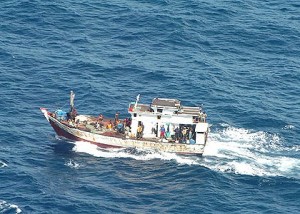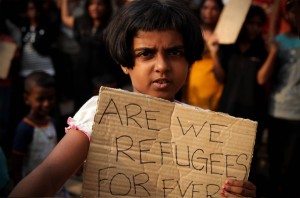Rejected asylum seekers abused in Sri Lanka, says rights group
Australian Immigration Minister Chris Bowen will head to Sri Lanka today (May 2, 2012) for a three-day visit, to strengthen cooperation among the two nations on the issue of people smuggling.
But Human Rights Watch is calling on the Minister to question the Sri Lankan government over its treatment of rejected asylum seekers during his trip as well.
Phil Lynch, the executive director of the Human Rights Law Centre, says asylum seekers who return to Sri Lanka are subjected to arbitrary detention, torture and other serious human rights abuses.
Presenter: Liam Cochrane
Speaker: Phil Lynch, the executive director of the Human Rights Law Centre
LYNCH: Well Human Rights Watch has documented at least eight cases where asylum seekers from Sri Lanka have been returned to Sri Lanka from the United Kingdom and have endured serious human rights abuses upon their returning, including as you mentioned torture and rape. And there’s documented credible medical evidence that they were beaten with batons, and in some instances burned with cigarettes. This feeds into a more significant issue, which is notwithstanding the end of hostilities in a formal sense in Sri Lanka, torture and ill-treatment remains quite widespread. There’s been inadequate steps taken to ensure accountability for war crimes and atrocities against civilians in the closing months of the civil war, and there is persistent ongoing cruel treatment and in some instances torture, including of dissidents, NGOs and journalists who are critical of the Sri Lankan government.
COCHRANE: What sort of responsibility then does the Australian Immigration Department have in returning rejected asylum seekers to that country amid these reports?
LYNCH: Well Australia has a very strict obligation of non-refoulement, which means that it is unlawful under international law, under both the Refugees Convention and also international human rights law, not to return a person to a place where they may endure torture or persecution. So there’s a very stringent obligation on the part of Australia not to return Sri Lankan asylum seekers in circumstances where there’s a reasonable apprehension that they may be subject to some form of ill-treatment or serious human rights abuse.
COCHRANE: So Australia’s letting down its responsibilities on those terms?
LYNCH: Well there’s certainly some evidence that asylum seekers in the past returned from Australia to Sri Lanka have endured torture and ill-treatment. But of equal if not greater concern is Australia’s cooperation with Sri Lanka around people smuggling issues, which is potentially putting the interests of the prevention of people smuggling above the interests of ensuring that people with a legitimate claim to asylum can’t actually exit Sri Lanka and seek asylum.
COCHRANE: How is the Australian government doing that?
LYNCH: Well the Australian government cooperates very closely with the Sri Lankan government around people smuggling and the prevention of people smuggling. It stations Australian Federal Police liaison officers in Sri Lanka to assist in ensuring that people can’t leave Sri Lanka in an irregular way and come to Australia. And in fact it provides Australian aid dollars to the Sri Lankan Department of Immigration and Emigration to assist them with border security measures.
COCHRANE: So essentially Australian assistance to Sri Lanka’s border control measures and to its people smuggling prevention programs is effectively trapping people who do desire to seek asylum from getting out and getting to a safe place?
LYNCH: Yes it certainly raises that risk. It increases the risk that in a country where there has not been adequate accountability for past war crimes and well documented war crimes, and where there’s evidence of ongoing persistent widespread torture and ill-treatment, it raises serious concerns that people are being trapped in that situation yes, and Australia’s playing an active or if not an active, then at least an acquiescent role.
COCHRANE: The fairly consistent line from the Sri Lankan government and from its envoys here in Australia has been that people are not subjected to these abuses, that they’re not at risk, that the war’s over, that everything’s ok. What would you like to see Australia’s Immigration Minister Chris Bowen put to the government during his visit?
Well I’d certainly like him to continue to call for accountability for war crimes in Sri Lanka in accordance with the recent UN Human Rights Council resolution on Sri Lanka, and notably that was a resolution which was supported by many countries which Sri Lanka may otherwise have called friends; countries such as India. So a key call for Sri Lanka to ensure independent effective investigations into alleged war crimes and accountability for perpetrators. The Immigration Minister should also be concerned about Australia’s role and making human rights considerations absolutely paramount in discussions with Sri Lanka about how we will cooperate on issues such as intelligence cooperation, military cooperation and border security.
Radio Australia, abc


